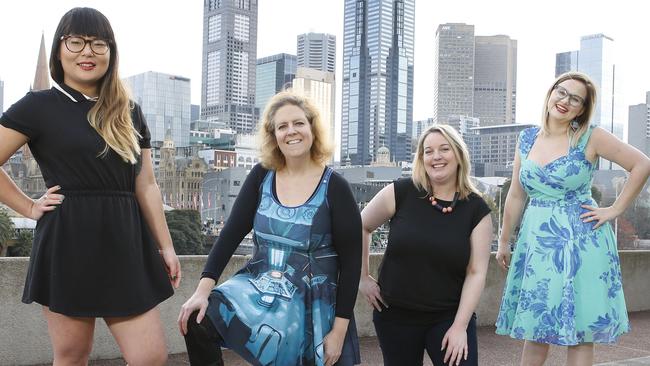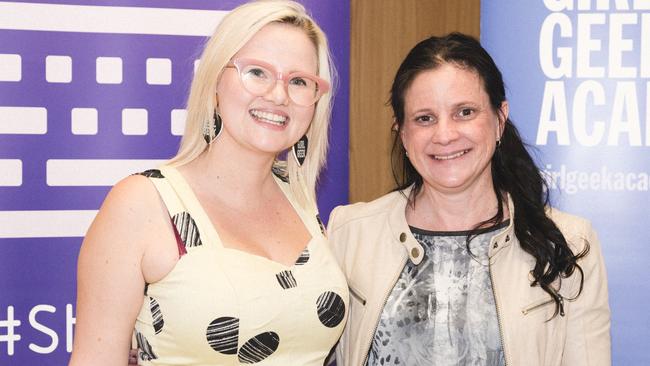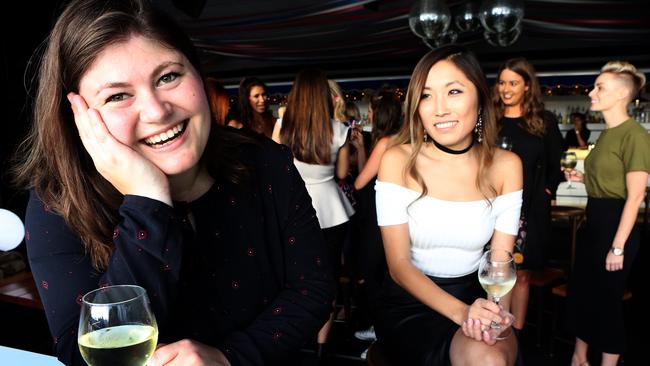Geek girls are bringing their own creative flair as they join the bros of tech
IT was once blokes as far as the eye could see in tech industries across Australia, but a new generation of girls and women are now jumping into the fray.

News
Don't miss out on the headlines from News . Followed categories will be added to My News.
LUCKILY for “tragic nerd” and one-time wannabe astronaut April Staines, when a guy trying to hire her made a sexist mess of the interview she could take it as “the funniest thing I have ever heard”.
Early in her career, Staines, now a software architect, Australian 3D-printing pioneer and co-founder of Melbourne’s booming coding for girls educator, Girl Geek Academy, surprised her interviewer by daring to apply for a tech job while being female.
“This project manager was looking for (software) developers, and when I turned up to the interview, he said, ‘Oh, you’re a woman. We’ve not had a woman developer before — we won’t know what to do with you,’ ” says Staines, a digital solution architect at the National Australia Bank.
“I said, ‘Well, I assume you want stuff coded.’ He said he would give me a test, and another guy comes out carrying this laptop, takes one look at me, turns his back and starts trying to clean it.”
“The guy says, ‘We have a bit of a problem with hygiene here, I’m not sure you’re a good fit’ — even before they gave me the test. He said, ‘See what he’s doing now, if you were a man that wouldn’t happen.’”
While this “silly” anecdote is relatively tame compared with the widespread Silicon Valley sexual harassment scandal that made global headlines this month, it captures the essence
of the way things were at the pointy end of tech.
Contrary to its boy-nerd branding, computing started out as female-friendly, with women commonly working in programming when it took off at scale in the US during World War II.
American mathematician Ada Lovelace is credited with having been the world’s first computer programmer and pioneer Captain Grace Murray Hopper helped create the first large-scale electronic computer.
But this stimulating field evolved into nigh on a girl-free zone once men returned and appropriated the territory. It became even more male-centric when home computers arrived and were marketed as “boys’ toys”.
Movies including Revenge of the Nerds and WarGames reinforced the idea the “hardcore” world of coding and hacking didn’t require ladies’ loos. By 2005, there were fewer women enrolling in computer science courses than in 1980.

Regular reports of sexual harassment of young women who did dare storm Silicon Valley didn’t help tech’s image as a career choice for girls. Yet technically minded women, including Staines and her Girl Geek Academy co-founders Sarah Moran, Amanda Watts and Lisy Kane, say they found the scene here in Australia more open and less hostile to women from relatively early on.
Now they are part of a flourishing “girl geek” tech scene. Even in the notoriously boysy world of online gaming, young women are making a big mark as designers and developers.
Girl Geek Academy partner Kane, also a games producer at Melbourne studio League of Geeks, attests: “We have a really special bubble in the games industry in Australia, we’re very, very supportive.
“There are amazing people driving the games industry in Australia and they 100 per cent see diversity as the way to a great industry and one that will be successful.”
In 2015, Kane curated Australia’s first all-female games creation day, #SheMakesGames.
Film Victoria has helped promote women’s presence in games development with its Women in Games Fellowship. Kane, a recipient in 2016, says the fellowship, one of a kind globally, is helping provide visible female role models.
“The fellowship helps women become leaders, to skill up really fast so you can be a leader and other women can see we are in the industry,” Kane says.
She was the only Australian in Forbes magazine’s 2017 “30 Under 30” list of global gaming innovators, and her work appears in ACMI’s upcoming Code Breakers exhibition, featuring the work of Australian and New Zealand women in games, starting on July 25.
Though women are still significantly under-represented in tech in Australia, occupying just an estimated 10 per cent of the gaming workforce, around 15 per cent of IT jobs and
28 per cent of tech jobs in science, technology, engineering and mathematics overall, they
are having huge successes.
YOUNG entrepreneur Gen George, who started her short-term hospitality and retail labour-hire site OneShift as a 21-year-old, sold one-third of her business to recruitment giant Programmed for $5 million in 2013. Last month, Programmed bought the rest of George’s company, which was recently valued at $18.2 million.
OneShift had more than 45,000 businesses listed, close to one million users and 56 staff.
“When I first started OneShift it was, ‘Oh, cool, you’re a girl and you’re doing something different,’ ” Sydney-based George says.
“As time went on it became, ‘So, what are you building, how is it tracking? As a (tech industries) market Australia is maturing; it is a supportive, inclusive, tight community.”
As well as having gone on to found the hospitality start-up Skilld and the “double-sided” (serving both those seeking and offering a service) ad-tech platform tamme, George created Like Minded Bitches Drinking Wine, a networking group for women in tech/digital/online industries.
Since its inception 18 months ago over drinks George had with friend Jane Lu, founder of the Showpo fashion site, LMBDW has swelled to a 40,000-strong global community.
George echoes what many other women in Australian tech told Weekend, that women in the local scene are very actively supporting and mentoring other women and encouraging girls.
“What’s great about the community is everyone’s trying to jump around and help everyone,” she says.

Moran says the group aims to teach one million girls and women to build technology and create start-ups by 2025. The group was awarded $300,000 by the State Government’s start-up seed fund LaunchVic in January, which it will use to roll out the world’s first all-female hackathon #SheHacks statewide.
At events in Warrnambool, Warragul and Bendigo, teams of three women “curated” by Girl Geeks conveners — comprising a “hacker” (coder), a “hipster” (designer) and a “hustler” (marketer) — work over a weekend to create a viable business idea. Teams are then given a month to build, market-test and pitch their minimal viable product (MVP) before getting early users on board. Finalists will be showcased at a #SheHacks showcase. Melbourne’s #SheHacks is on this weekend.
Girl Geeks makes a point of creating a healthy work culture, even on hackathons, including proper food and structured work hours to counter the (correct) image of tech being a place where only people who can tough out working 14 hours straight on a pizza diet will thrive. Moran has made the tea set a geek emblem.
While #SheHacks is aimed at tertiary-aged women, Girl Geeks also runs the MissMakesCode program for five to eight-year-old girls, created by teachers and linked to the digital technologies curriculum. Older girls can participate in other female coding networking events run by grassroots workshopping groups such as Code Like a Girl.
“We hope that by engaging young girls in coding, we can make this a native skill as much as reading and writing and capture them before gender bias (away from tech) kicks in,” says Moran, who learned to code as a five-year-old.
Moran agrees discrimination in Australia’s tech scene is not as evident as in Silicon Valley, where she experienced it first-hand.
“The most crazy meeting I had was with a guy who said, ‘I’ve got to hire 40 (software) engineers by the end of the year, and I would totally hire more women but I don’t want to lower the bar,” she says. “My jaw hit the table.”
Moran says Melbourne’s reputation as a diversity-friendly tech capital is spreading to the point where the brain drain to Silicon Valley is starting to reverse.
“We’re seeing a number of female founders and tech workers from the US looking to make Australia home,” Moran says.
She credits the City of Melbourne and State Government with having “worked hard to create an environment where high-growth tech start-ups feel welcome and supported, and where there is strong support for diversity within that community”.
ANOTHER ambitious program, Robogals, a student-run volunteer initiative started out of the University of Melbourne in 2008, is also helping large numbers of young women discover the joys and potential of engineering through robotics.
Created by then mechatronics undergraduate Marita Cheng — who became 2012 Young Australian of the Year — and friends, Robogals Global now has “chapters” at universities across Asia, Europe, Africa and the US that run interactive, engineering-based workshops for girls aged eight to 18.
CEO Ami Pasricha says the project has reached 65,000 young people already. Boys are also offered workshops by Robogals chapters.
“One of the key things we’ve done this year is to release our global 2020 strategy, which divides into four areas, including inspiring girls — we want to reach 200,000 by 2020 — having repeat workshops for girls to have a deeper level of impact and to track the number of workshops she has and the subjects she chooses from years 9 to 12 and at university,” says Pasricha, who is on Telstra’s graduate program.
Pasricha says it is more likely computer systems engineering graduates such as herself, will now be treated “just as graduates” by employers who understand the value of diversity; not as “a male or female graduate”.
This positive shift is also noted by leaders such as Professor Bronwyn Fox, director of Swinburne University’s Manufacturing Futures Research Institute and its Factory of the Future. She says with the “fourth industrial revolution”, the digital transformation of the manufacturing process, well under way, she has seen increasing recognition of the contribution women make in tech industries and more inclusion.
Fox is one of many strong female STEM (science, technology, engineering and maths) role models working to encourage more young women into the fields. In her previous role at Deakin University, she was a co-founder of Geelong’s $100 million research precinct, the Carbon Nexus facility.
Fox has “never understood” why tech and STEM subjects generally have been seen as more suitable for men.
“I never saw barriers,” she says. “The important message is that diversity is so important because you need teams of people to come together to solve complex problems, not just of diverse gender but of backgrounds.
“Working in teams and working collaboratively is something women do incredibly well and that’s being recognised more and more We are really valuable in that space.”
Code Breakers, Women in Games: Celebrating the Achievements of Australian and New Zealand Women Working in Video Games, ACMI, July 25-November 5. acmi.net.au


